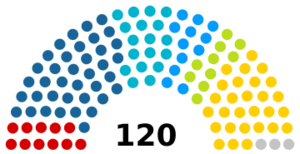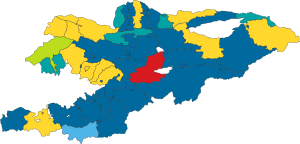2015 Kyrgyz parliamentary election facts for kids
The 2015 Kyrgyzstani parliamentary election was held on October 4, 2015. This was a big day when people in Kyrgyzstan voted for their representatives in the country's parliament. The parliament is called the Supreme Council.
Contents
How Votes Were Counted
The Supreme Council has 120 seats. These seats were filled using a system called proportional representation. This means that if a political party received a certain percentage of all the votes, they would get about the same percentage of seats in the parliament. For example, if a party got 10% of the votes, they would get about 10% of the seats.
To get any seats at all, a party had to receive at least 7% of all the votes. Also, no single party was allowed to win more than 65 seats. This rule helps make sure that power is shared among different parties.
What Happened Before the Election
Many political parties were formed before this election. Often, these parties were started by people who wanted to promote their own ideas and interests.
Some people who wanted to become candidates were not allowed to run. This was because they had been involved in serious past issues.
Election Results
Here is a table showing how many votes and seats each party won:
| Presidential election | |||
|---|---|---|---|
| Choice | Votes | % | Seats |
| Social Democratic | 435,968 | 26.81% | 38 |
| Respublika–Ata-Zhurt | 320,115 | 19.68% | 28 |
| Kyrgyzstan | 206,094 | 12.67% | 18 |
| Onuguu–Progress | 148,279 | 9.12% | 13 |
| Bir Bol | 135,875 | 8.36% | 12 |
| Ata Meken Socialist | 123,055 | 7.57% | 11 |
| others | 212,031 | 13.04% | 0 |
| against all | 12,428 | 0.76% | |
| invalid ballots | 32,410 | 1.99% | |
| Total votes | 1,626,255 | 100% | 120 |
How the Election Was Seen
Even though there were some small reports of problems, international groups watched the election closely. The OSCE said that the elections were "lively and competitive." They also said the election was "unique in this region." This means it stood out compared to other elections nearby.
The PACE also agreed. They said that voters were able to "make their choice freely" among many different candidates.
The OSCE did point out some issues with how voters were registered. The Council of Europe also had some concerns about how open and clear some of the campaigns and their funding were.
Images for kids
See also
 In Spanish: Elecciones parlamentarias de Kirguistán de 2015 para niños
In Spanish: Elecciones parlamentarias de Kirguistán de 2015 para niños




